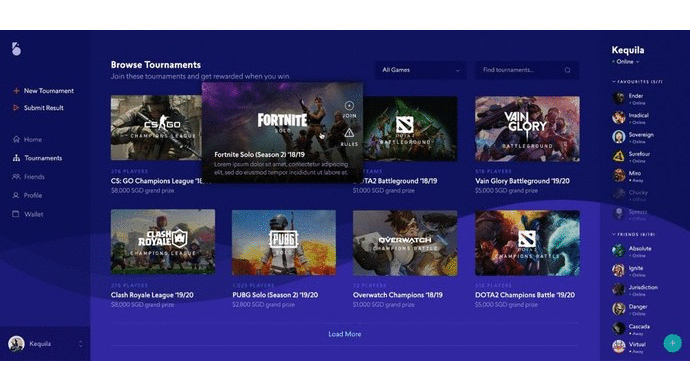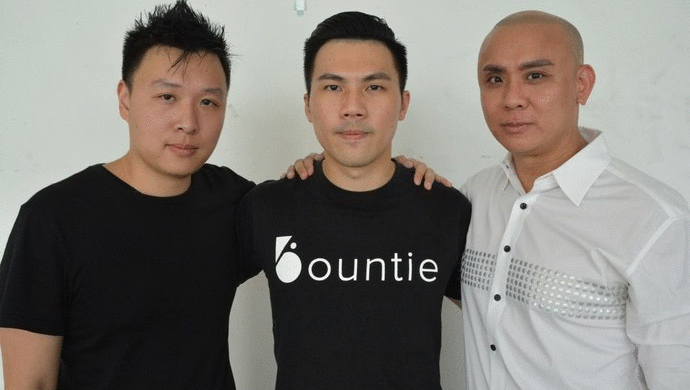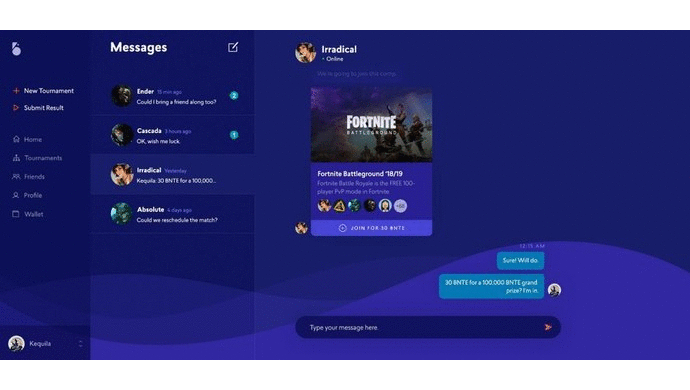Bountie wants to create an economy for gamers, powered by blockchain-based digital coins

The e-sports scene took off nearly two decades ago, when gamers were huddled around bulky CRT monitors, surrounded by long lines of cables hooked up to servers.
Back then, these tournaments were not extravagant: there were less showmanship; earnings were generally not substantial (though the most prolific gamer then, Johnathan “Fatal1ty” Wendel, scored US$40,000 in winnings in an Alien vs. Predator 2 tournament in 2001); and it was near impossible to make a full-time career out of it.
Most e-sports viewers consisted of offline spectators; there wasn’t a dedicated platform for streaming games then. To watch a live match, say a Counter-Strike game, an IP address was provided to interested online parties, who would then boot up their copy of the game and key in the address to join as spectators. And each match can only accommodate a very limited number of slots.
The purpose of these descriptions is to really illustrate how rudimentary and crude competitive gaming was when broadband connections were just becoming mainstream.
Today, e-sports has become an industry to be reckoned with. A report by Statista, estimates that the global e-sports market’s value will hit US$905 million this year, nearly twofold of that in 2016. And these days, it isn’t just gaming-related brands who come on as sponsors; multinational corporations such as Coca-Cola, Redbull, and Audi are chipping in money and backing teams.
The proliferation of streaming platforms like Twitch, which has approximately 100 million viewers per month, has also helped garner a wider audience — globally — for gaming tournaments.
Oh, and did I mention that player-vs-player (PvP) battle arena game, Dota 2, offered US$24 million for its international competition last year? Not bad for a game that started out as a humble user-created mod for Warcraft 3 in 2003.
But is the room for further evolution in the industry? Jose He, Co-founder of Singapore startup Bountie, seems to think so, thanks to increasing adoption of blockchain technology — and its byproduct, cryptocurrency.
The platform aspires to be a thriving gaming economy that will let players and organisers arrange their own tournaments and make transactions in its cryptocurrency — Bountie tokens. Merchants will also be able to purchase advertising space and brand partners can sponsor tournaments using these digital tokens.
Also Read: Search gaming Myanmar-based mobile gaming subscription startup Goama launches in India
Using blockchain to power its platform also lets Bountie store user data securely. The platform intends to track gamers’ data and — such as their gaming performances — to matchmake them with opponents of similar skill levels.
Bountie’s ecosystem also allows users to serve as referees. According to its whitepaper, they “serve as the final gateway before matches and rewards are processed.”
“The network of Referee nodes act as a decentralized proxy that has the ability to connect to game APIs and cross-refer game outcomes to ensure no false, fraudulent, or suspicious matches are being processed by the platform.” As a reward, referees will get a small percentage of the match’s token transactions — between 1 to 3 per cent, depending on the game’s length.
Users will be able to use Bountie tokens to purchase on items such as gaming accessories or services such as private shoutcasting (commentators).
e27 speaks to He in an email interview to find out more about his background and the mechanics of the platform.
Below is the excerpt, edited for clarity:
Tell me about your background. Were you an avid gamer?
I was an avid gamer since young. It started when my uncle bought his new computer. He was installing a “Space-Alien War” game from a floppy disk!
I was “hooked” the moment he taught me on how to play the game. I was 4 years old! What followed was a series of Nintendo, SEGA, Arcades, Playstation and mobile games.
Later in my career, I had the opportunity to co-manage an academy specialized in corporate and entrepreneurship training. In 2015, I set out my mind to step out of my comfort zone and jump right into the pet industry and joined the tech startup community as an entrepreneur.
Having no experience at all in the booming industry, at the age of 35, most would think it was either a daring or foolish move. I sold my car and shifted out of my condo. I went back to my parent’s place, “couchsurfing” in their living room’s sofa. I used all the money I had and started pet service company Cuzzey.
In 2017, as fate would have it, some friends and I got together after a gaming session. It was there that we decided to work cohesively to tackle the pain-point of day-to-day gamers and crafted out what would have been the initial blueprints of Bountie.
Why venture into the gaming/e-sports space? What are the opportunities available?
There are 2.2 billion gamers in the world. Which means 1 in 4 of us is a gamer. The Asia market alone accounts for 53 per cent of the industry’s revenues. We aim to empower 97 per cent of these everyday gamers in the world. The global revenue for the gaming industry is projected to grow +8.2 per cent compounded annual growth rate (CAGR) and hit US$143.5 billion in 2020.
The market size is one of the main reasons we got into this business. And when we look at the trend set by the millennials so far, a lot of the viewerships are moving towards esports.
Looking at Twitch.tv’s numbers, right now there are more viewers watching gamers playing games than people watching the news on CNN. If you’re a brand, it makes sense for you to move a majority of your advertising dollars from traditional media into esports.

From left: Darren Lee, Chief Operation Officer; Lex Na, CEO; Jose He, Chief Performance Officer
And most importantly, I’m a gamer. And gaming is my passion. I truly empathize with the millions of gamers out there who love gaming but can’t monetize their skills. Furthermore, gaming has always been considered a waste of time. Now, Bountie is here to make a difference and allow our gamers to not just pay to play but get paid to play.
How does blockchain help in matchmaking? Do elaborate on the algorithm and how players stand to benefit and more importantly, how is this better than traditional matchmaking tournaments?
When gamers win in matches or tournaments, they get paid in Bountie (BNTE) Tokens, which can be cash out into fiat money, exchanged into any other major cryptocurrency or spent on our e-commerce platform.
Traditional matchmaking tournaments focus mainly on in-game currencies which can’t be converted into fiat. At best, what these in-game currencies can do for gamers is using these currencies to exchange for gaming items like gaming mouse or online skins and etcetera.
Also Read: Playx4 returns for the 10th year, bringing in global game developer companies to South Korea
What everyday gamers prefer these days are something more pragmatic like actual real money that can feed or provide a living for them and their family. We are using ERC20 protocols. The smart contracts allow execution and delivery of Bountie winnings, and we can use it to “lock up” funds in cases of cheating, verify participation of events, and prevent hackers from creating digital currency out of thin air.
Traditional tournaments will usually require 6 to 9 months to disburse prize money to the winners due to regulatory reasons and taxation. With blockchain technology, we are able to speed that up and process the transaction almost instantaneously to the winners.
Our platform features include: instant prize winning transfers, little to no transaction fees, continuous weekly and monthly tournaments for games (always-on tournaments), safely-protected accounts via blockchain technology.
Players can earn Bountie tokens by winning games and tournaments, attaining top ranks on leaderboards, providing referrals, winning trophies and achievements and by providing witnessing service.
What can the tokens be used for? Can they only be used in the Bountie ecosystem or will they also be traded on crypto exchanges?
They can be used in the following ways:
- Joining pro tournaments;
- Purchasing gaming items from our virtual stall with our gaming partners;
- Converted to other cryptocurrencies such as Bitcoin and Ether;
- They can also be spent using crypto credit cards;
How can one purchase the Bountie tokens? Will you hold an ICO?
We are currently in the midst of our private sale. Interested parties may acquire our tokens by directly contacting our company or me. Our Pre-ICO will begin on September 23, 2018.
Are you establishing relationships with existing tournament organisers? If so, who are they?
As a tournaments organizer, Bountie is preparing our partnership with Twitch for the upcoming FPS (First Person Shooter) CS-GO competition in Asia later part of the year.
We are also planning to roll out inter-university esports tournaments in Singapore starting with James Cook University. Action Community for Entrepreneurship (ACE) and Enterprise Singapore Gaming (ESP) are also both very supportive.
Who is your target market and why?
Most traditional tournament focus on a prize pool that is only available to the top 3 per cent of the competitive gamers and there are simply not enough tournaments available going around to serve the rest of the 97 per cent gamers in the world.
What we want to achieve is to reach out to the everyday gamers out there, starting with Asia, empowering them with the opportunity to make a living while playing their favourite games, anytime, anywhere.
What kind of games will be available on your platform? Will Fortnite and Overwatch be featured?
We are essentially a tournament bracket platform for types of games as long as the game itself possesses a competitive element. We are game agnostics, which means there are no limitations to what games we want to host and when we host it. Games like Fornite and Overwatch will definitely be a popular choice among gamers.
What is your roadmap for Bountie?
To begin, we will scale in South East Asia as the ultimate choice for everyday gamers to partake in tournaments to receive prize money.
To support that, we will launch our offline initiative: a Bountie esports arena across Southeast Asia starting with one in Singapore. It will be an approximately 7,000 sqft location with more than 120 Nvidia platinum chip in every computer.

Moving forward, we would like to become the “Linkedin” for everyday gamers. I must say that the gaming industry is extremely fragmented. Gamers have multiple profiles across different games, with data and progress siloed within each game. We want to address this fragmentation and have gamers create one universal profile for all games.
When do you expect to launch Bountie?
Our MVP is stipulated to be launch on 15 September 2018. We are honoured to have our product soft launch in Bangkok after being invited by the government’s Digital Economy Promotion Agency (DEPA). The Thailand government has supportive of esports startups like Bountie, and this will help improve the gaming space in Southeast Asia.
—
Image Credit: Bountie
The post How Singapore startup Bountie aims to change the e-sport scene using cryptocurrency appeared first on e27.